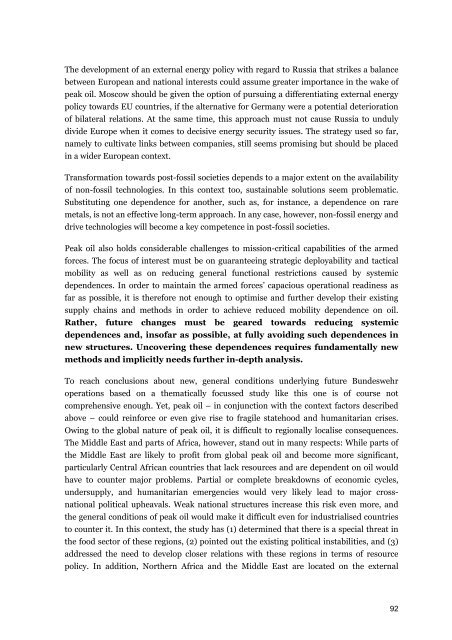PEAK OIL
PEAK OIL
PEAK OIL
You also want an ePaper? Increase the reach of your titles
YUMPU automatically turns print PDFs into web optimized ePapers that Google loves.
The development of an external energy policy with regard to Russia that strikes a balance<br />
between European and national interests could assume greater importance in the wake of<br />
peak oil. Moscow should be given the option of pursuing a differentiating external energy<br />
policy towards EU countries, if the alternative for Germany were a potential deterioration<br />
of bilateral relations. At the same time, this approach must not cause Russia to unduly<br />
divide Europe when it comes to decisive energy security issues. The strategy used so far,<br />
namely to cultivate links between companies, still seems promising but should be placed<br />
in a wider European context.<br />
Transformation towards post-fossil societies depends to a major extent on the availability<br />
of non-fossil technologies. In this context too, sustainable solutions seem problematic.<br />
Substituting one dependence for another, such as, for instance, a dependence on rare<br />
metals, is not an effective long-term approach. In any case, however, non-fossil energy and<br />
drive technologies will become a key competence in post-fossil societies.<br />
Peak oil also holds considerable challenges to mission-critical capabilities of the armed<br />
forces. The focus of interest must be on guaranteeing strategic deployability and tactical<br />
mobility as well as on reducing general functional restrictions caused by systemic<br />
dependences. In order to maintain the armed forces’ capacious operational readiness as<br />
far as possible, it is therefore not enough to optimise and further develop their existing<br />
supply chains and methods in order to achieve reduced mobility dependence on oil.<br />
Rather, future changes must be geared towards reducing systemic<br />
dependences and, insofar as possible, at fully avoiding such dependences in<br />
new structures. Uncovering these dependences requires fundamentally new<br />
methods and implicitly needs further in-depth analysis.<br />
To reach conclusions about new, general conditions underlying future Bundeswehr<br />
operations based on a thematically focussed study like this one is of course not<br />
comprehensive enough. Yet, peak oil – in conjunction with the context factors described<br />
above – could reinforce or even give rise to fragile statehood and humanitarian crises.<br />
Owing to the global nature of peak oil, it is difficult to regionally localise consequences.<br />
The Middle East and parts of Africa, however, stand out in many respects: While parts of<br />
the Middle East are likely to profit from global peak oil and become more significant,<br />
particularly Central African countries that lack resources and are dependent on oil would<br />
have to counter major problems. Partial or complete breakdowns of economic cycles,<br />
undersupply, and humanitarian emergencies would very likely lead to major crossnational<br />
political upheavals. Weak national structures increase this risk even more, and<br />
the general conditions of peak oil would make it difficult even for industrialised countries<br />
to counter it. In this context, the study has (1) determined that there is a special threat in<br />
the food sector of these regions, (2) pointed out the existing political instabilities, and (3)<br />
addressed the need to develop closer relations with these regions in terms of resource<br />
policy. In addition, Northern Africa and the Middle East are located on the external<br />
92


